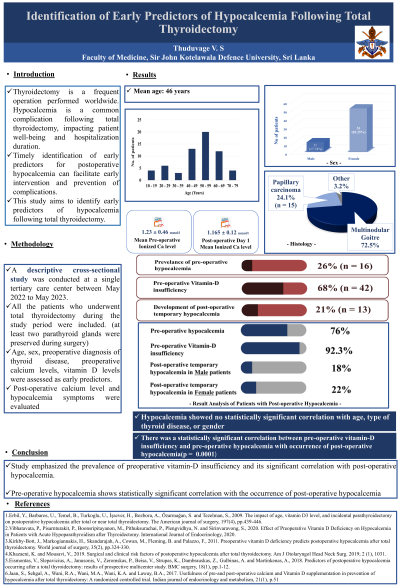Head and Neck Surgery
(0658) Identification of Early Predictors of Hypocalcemia Following Total Thyroidectomy
Monday, September 30, 2024
12:00 PM - 1:00 PM EDT

Has Audio
Disclosure(s):
Vasanthika Sanjeewanie Thuduvage, MBBS, MD, DOHNS ,: No relevant relationships to disclose.
Introduction: Thyroidectomy is a frequent operation performed worldwide. Hypocalcemia is a common complication following total thyroidectomy, impacting patient well-being and hospitalization duration. Timely identification of early predictors for postoperative hypocalcemia can facilitate early intervention and prevention of complications. This study aims to identify early predictors of hypocalcemia following total thyroidectomy.
Methods: A descriptive cross-sectional study was conducted at a single tertiary care center between May 2022 to May 2023. All the patients who underwent total thyroidectomy during the study period were included. Age, sex, preoperative diagnosis of thyroid disease, preoperative calcium levels, and vitamin D levels were assessed as early predictors. Postoperative calcium level and hypocalcemia symptoms were evaluated.
Results: Out of total 62 patients, 80% (n = 51) were female patients and mean age was 46 years. Of them, 13 patients (21%) developed postoperative temporary hypocalcemia. The most common histology being a multinodular goiter (n = 45; 72.5%) and papillary carcinoma (n = 15; 24.1%). The mean preoperative ionized Ca level was 1.23 ± 0.46 mmol/l, and postoperative day 1 mean ionized Ca was 1.165 ± 0.12 mmol/l proposing decrease in mean of ionized Ca++ in postoperative day 1 (p = 0.0001). Notably, the study reported preoperative vitamin-D insufficiency in 68% patients (n = 42). Prevalence of preoperative hypocalcemia was 26%(n = 16). Hypocalcemia showed no statistically significant correlation with age, type of thyroid disease, or gender. There was a statistically significant correlation between preoperative vitamin-D insufficiency and preoperative hypocalcemia with occurrence of postoperative hypocalcemia.
Conclusions: The study emphasized the prevalence of preoperative vitamin-D insufficiency and and its significant correlation with postoperative hypocalcemia. Preoperative hypocalcemia shows statistically significant correlation with the occurrence of postoperative hypocalcemia.

Vasanthika Sanjeewanie Thuduvage, MD, MBBS, DO-HNS
Dr
General Sr John Kotelawala Defence University/ University Hospital KDU
Colombo 03, Western Province, Sri Lanka
